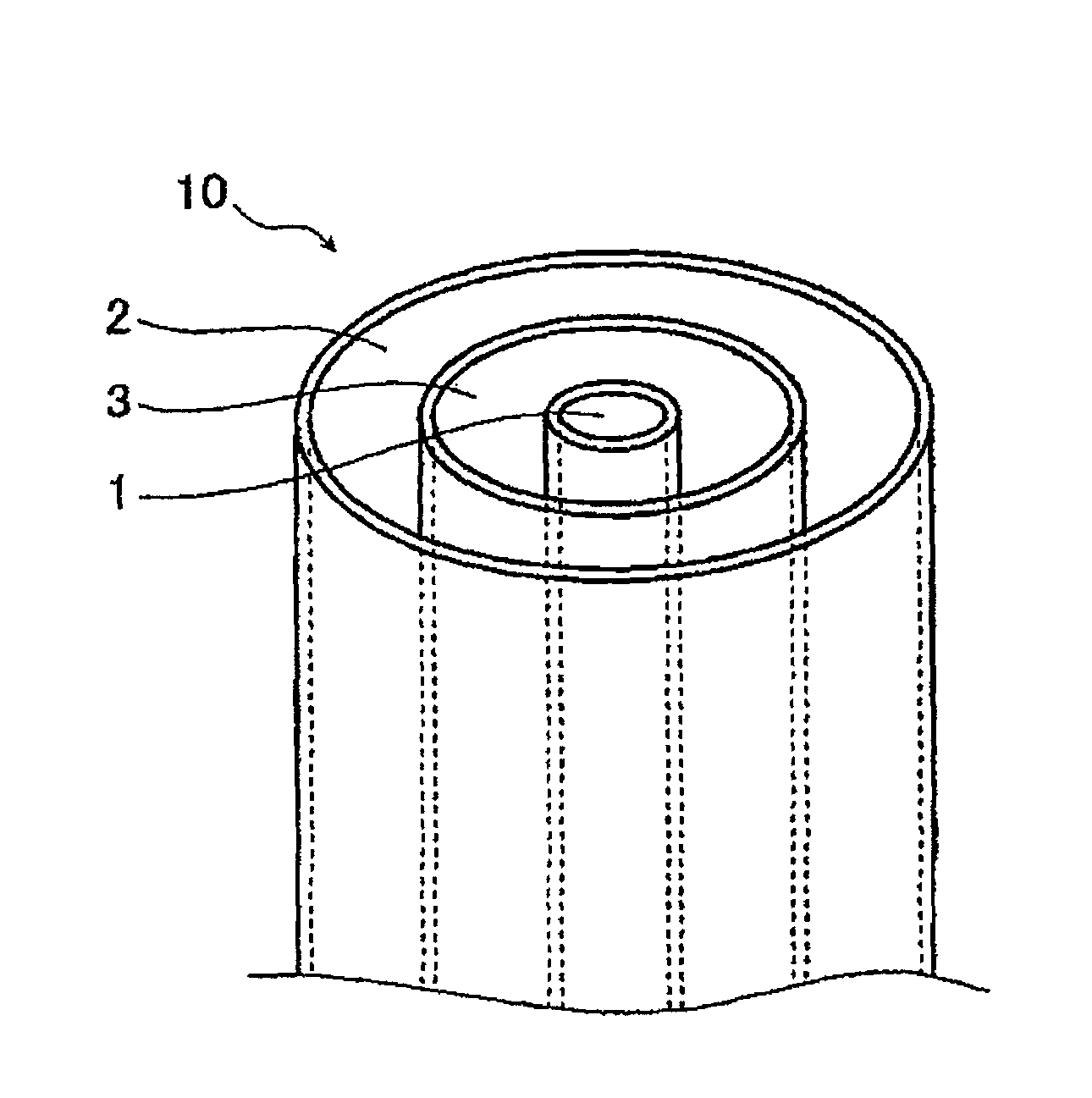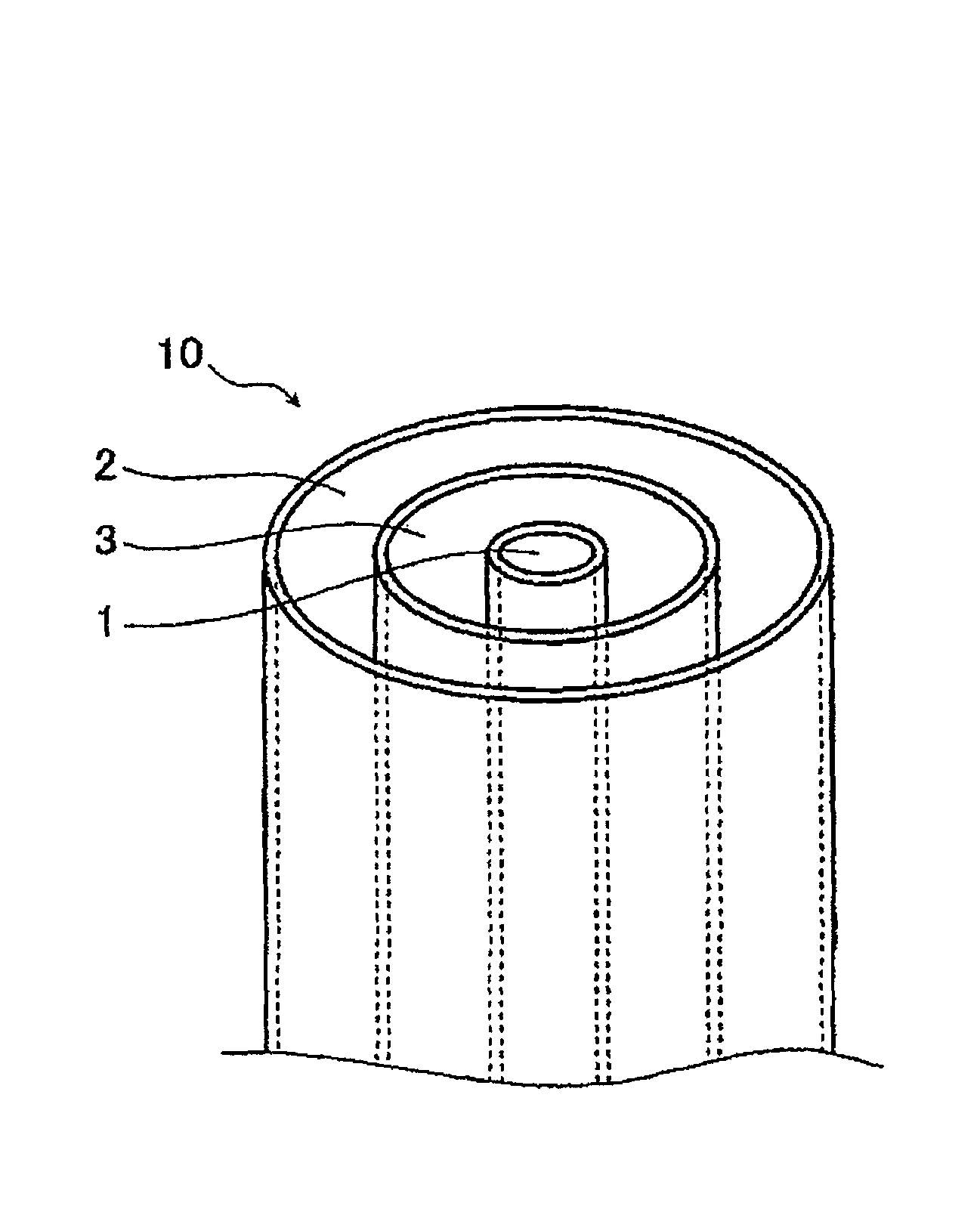Process for producing porous quartz glass object, and optical member for EUV lithography
a technology of porous quartz glass and optical member, which is applied in the direction of glass making apparatus, glass deposition burners, manufacturing tools, etc., can solve the problem that the refractive optical system cannot be used, and achieve the effect of small concentration distribution and easy control
- Summary
- Abstract
- Description
- Claims
- Application Information
AI Technical Summary
Benefits of technology
Problems solved by technology
Method used
Image
Examples
example 1
[0113]TiCl4 as the gas of the group (A), SiCl4 as the gas of the group (B) and H2 as the gas of the group (C) were used. Also, N2 was used as the gas of the group (D). A proportion of the gas of the group (D) in the mixed gas was 25 mol %. Each of proportions of the gases of the groups (A) to (C) was as follows.
[0114]Gas of the group (A): 0.5 mol %
[0115]Gas of the group (B): 13.1 mol %
[0116]Gas of the group (C): 61.4 mol %
[0117]The gases of the groups (A) to (D) were introduced into a premixing tank kept at 75° C. through different ports from each other, and these gases were diffused and mixed such that a gas concentration was uniform within the tank. Thereafter, the temperature of a conduit was gradually increased, and the mixed gas heated at 200° C. was allowed to pass through a static mixer manufactured by Apriori Corporation and a gas filter manufactured by Pall Corporation, and fed into a central nozzle of a multitubular burner. O2 was fed as the gas of the group (E) into a per...
example 2
[0119]O2 as the gas of the group (C), and into a peripheral nozzle, H2 as the gas of the group (E) are fed. The other gas conditions are the same as Example 1.
[0120]The gases of the groups (A) to (D) are introduced into a premixing tank kept at 75° C. through different ports from each other, and these gases are diffused and mixed such that a gas concentration is uniform within the tank. Thereafter, the temperature of a conduit is gradually increased, and the mixed gas heated at 200° C. is allowed to pass through a static mixer manufactured by Apriori Corporation and a gas filter manufactured by Pall Corporation, and fed into a central nozzle of a multitubular burner. Under this condition, a porous TiO2—SiO2 glass body having a diameter of about 300 mm and a length of about 500 mm is produced by hydrolysis in an oxyhydrogen flame. At the production of the porous TiO2—SiO2 glass body, a flame temperature of the burner in a region where the mixed gas passes through is 1,400° C.
[0121]By...
example 3
[0122]H2 as the gas of the group (C) and He as the gas of the group (D) are used. A proportion of the gas of the group (D) in the mixed gas is 42 mol %. The other gas species are the same as Example 1. Each of proportions of the gases of the groups (A) to (C) is as follows.
[0123]Gas of the group (A): 0.5 mol %
[0124]Gas of the group (B): 13.1 mol %
[0125]Gas of the group (C): 44.4 mol %
[0126]The gases of the groups (A) to (D) are introduced into a premixing tank kept at 75° C. through different ports from each other, and these gases are diffused and mixed such that a gas concentration is uniform within the tank. Thereafter, the temperature of a conduit is gradually increased, and the mixed gas heated at 200° C. is allowed to pass through a static mixer manufactured by Apriori Corporation and a gas filter manufactured by Pall Corporation, and fed into a central nozzle of a multitubular burner. Under this condition, a porous TiO2—SiO2 glass body having a diameter of about 300 mm and a l...
PUM
| Property | Measurement | Unit |
|---|---|---|
| flame temperature | aaaaa | aaaaa |
| flame temperature | aaaaa | aaaaa |
| wavelength | aaaaa | aaaaa |
Abstract
Description
Claims
Application Information
 Login to View More
Login to View More - R&D
- Intellectual Property
- Life Sciences
- Materials
- Tech Scout
- Unparalleled Data Quality
- Higher Quality Content
- 60% Fewer Hallucinations
Browse by: Latest US Patents, China's latest patents, Technical Efficacy Thesaurus, Application Domain, Technology Topic, Popular Technical Reports.
© 2025 PatSnap. All rights reserved.Legal|Privacy policy|Modern Slavery Act Transparency Statement|Sitemap|About US| Contact US: help@patsnap.com


